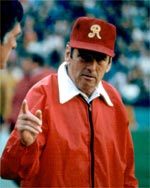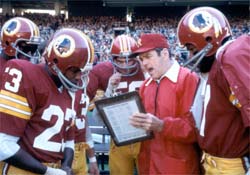|
In a profession dominated by X-and-O-driven workaholics, George Allen was state of the art. During the season, he was so focused on football he might not have noticed World War III. Every moment was concentrated on the game. A visit home was a rarity for him. Allen believed, "Every day you waste is one you can never make up." He defined leisure time as "that five or six hours when you sleep at night."
"Winning," he explained, "is the science of being totally prepared." He added, "There is no detail too small."
 His zealous attention to detail paid off in victories. In twelve years of NFL coaching, Allen never had a losing season. His overall mark was 118-54-5 - the tenth best record in NFL history at the time of his retirement. His teams made the playoffs seven times and only twice finished as low as third in their division. His reputation was not only as a winner but also as a coach who could take a losing franchise and turn it around. "Every time you win, you're reborn," Allen said. "When you lose, you die a little." His zealous attention to detail paid off in victories. In twelve years of NFL coaching, Allen never had a losing season. His overall mark was 118-54-5 - the tenth best record in NFL history at the time of his retirement. His teams made the playoffs seven times and only twice finished as low as third in their division. His reputation was not only as a winner but also as a coach who could take a losing franchise and turn it around. "Every time you win, you're reborn," Allen said. "When you lose, you die a little."
Of course winning was important. But undoubtedly he would have followed the same grueling regimen had his teams played in some sort of Politically Correct League where no one ever lost.
But where other single-minded mentors burned out, Allen thrived. His fanatical devotion to duty wasn't something he did to achieve something else; it was the end itself. "He had to coach to live," according to John Schulian, who covered the Redskins for the Washington Post during Allen's time there. "It was that simple. That was his life. You weren't letting this guy breathe if you weren't letting him coach."
George Herbert Allen was born on April 29, 1918, in Detroit, MI, where his father worked in an auto plant. He showed his dedication early by compiling a perfect attendance record while lettering in football, basketball, and track at Lake Shore High School. Although he was named all-conference in basketball and set a school record in the long jump, football was his preference.
At little Alma College and later at Marquette University, where he was sent as an officer trainee in the U.S. Navy's World War II V-12 program, Allen played end. His abilities were such that he decided coaching was his future. He finished the war as athletic adjutant at the Farragut Navy base, and then entered the University of Michigan where he earned his M.S. in Physical Education in 1947. While at Lansing, he assisted Fritz Crisler, one of the most successful and respected football coaches of his time.
In 1948, Allen became coach at Morningside College in Iowa. Over three years, he compiled a 15-2-2 record. From 1951 through 1956, he coached Whittier College in California where he put together a 32-22-5 mark. All the time he had his eye on better things. He attended numerous coaching clinics both to learn and to meet the famous coaches conducting them. He always made certain they knew his name. Later, he reminded them by sending congratulatory telegrams whenever one achieved anything notable.
Allen was later to say, "Most men succeed because they are determined to."
He was named to Sid Gillman's staff with the Los Angeles Rams in 1957. Determination had led him to the NFL. But after one season, he was out. The Rams were in the middle of an ugly dispute among the owners, and the coaching staff suffered collateral damage.
Fortunately, George Halas had an opening in 1958 and offered Allen a position on his Chicago Bears staff. His contributions increased in the next couple of years. Although he had no title, Allen had a large measure of influence on the Bears' draft and was responsible for drafting several players who later helped Chicago to a championship. Most ironic considering Allen's later use of the draft.
Allen took over the defense in 1962. Although the Bears put a mundane offense on the field, Allen installed a zone defense that took the team to the 1963 NFL Championship. Doug Atkins, Stan Jones, and Bill George cemented their future enshrinement in the Pro Football Hall of Fame. Other Bear defensive stars included linemen Ed O'Bradovich and Fred Williams, linebackers Joe Fortunato and Larry Morris, and defensive backs Richie Petitbon, Bennie McRae, Dave Whitsell, and Roosevelt Taylor. After Chicago's 14-10 title game victory over the New York Giants, the team voted Allen the game ball.
Allen was a hot head coach prospect in the NFL for several years. In 1966, the Los Angeles Rams, with owner Dan Reeves at last firmly in charge, offered him a contract. When Allen accepted, George Halas exploded. After pointing out that Allen was still under contract to Chicago, "Papa Bear" sued and won. Then, having proved the sanctity of an NFL contract, Halas released Allen and let him join the Rams.
The Rams had struggled to a 4-10 mark in 1965. Allen set about making changes that brought the team in at 8-6 in his first season.
The Allen way of doing things soon became evident.
 First off, he valued veterans over rookies. During the next few years, Allen showed he liked experience on the field even more than the ice cream he was often photographed eating. He talked longtime Ram Jack Pardee out of retirement, brought in veterans Bill George, Maxie Baughan, Myron Pottios, Roger Brown, Richie Petitbon, and Irv Cross, and meshed them with the Rams' Fearsome Foursome of Deacon Jones, Lamar Lundy, Merlin Olsen, and Rosey Grier. Meanwhile, draft choices were something to be traded for more veterans. A rookie who happened to make the team was looked on almost as a potential carrier of a contagious disease. First off, he valued veterans over rookies. During the next few years, Allen showed he liked experience on the field even more than the ice cream he was often photographed eating. He talked longtime Ram Jack Pardee out of retirement, brought in veterans Bill George, Maxie Baughan, Myron Pottios, Roger Brown, Richie Petitbon, and Irv Cross, and meshed them with the Rams' Fearsome Foursome of Deacon Jones, Lamar Lundy, Merlin Olsen, and Rosey Grier. Meanwhile, draft choices were something to be traded for more veterans. A rookie who happened to make the team was looked on almost as a potential carrier of a contagious disease.
When he was criticized for mortgaging his team's future by not developing young players, Allen answered with the phrase most associated with him: "The future is now."
Allen's knack for the motivational phrase was legend. To an outsider, he might seem the master of the sound-bite saw, but his players bought it - perhaps because they knew Allen himself believed what he said.
In his second season with the Rams, his team went 11-1-2 and won the NFL's Coastal Division, but they were no match for Lombardi's Packers in the conference playoff at Milwaukee, falling 28-7. Nevertheless, the Associated Press, United Press International, and The Sporting News named Allen NFL Coach of the Year.
Allen was also one of the first coaches to emphasize special teams. That was part of his extraordinary attention to detail. Sometimes he seemed to go to extremes. He once hired a left-footed punter for practices before a game with a team that employed a lefty kicker. On another occasion, he held a practice during the time when the sun was in the same position as it would be in an upcoming game. Allen believed such maniacal concentration on minutia might make the difference between winning and losing.
CONTINUED >>>
|


 His zealous attention to detail paid off in victories. In twelve years of NFL coaching, Allen never had a losing season. His overall mark was 118-54-5 - the tenth best record in NFL history at the time of his retirement. His teams made the playoffs seven times and only twice finished as low as third in their division. His reputation was not only as a winner but also as a coach who could take a losing franchise and turn it around. "Every time you win, you're reborn," Allen said. "When you lose, you die a little."
His zealous attention to detail paid off in victories. In twelve years of NFL coaching, Allen never had a losing season. His overall mark was 118-54-5 - the tenth best record in NFL history at the time of his retirement. His teams made the playoffs seven times and only twice finished as low as third in their division. His reputation was not only as a winner but also as a coach who could take a losing franchise and turn it around. "Every time you win, you're reborn," Allen said. "When you lose, you die a little." First off, he valued veterans over rookies. During the next few years, Allen showed he liked experience on the field even more than the ice cream he was often photographed eating. He talked longtime Ram Jack Pardee out of retirement, brought in veterans Bill George, Maxie Baughan, Myron Pottios, Roger Brown, Richie Petitbon, and Irv Cross, and meshed them with the Rams' Fearsome Foursome of Deacon Jones, Lamar Lundy, Merlin Olsen, and Rosey Grier. Meanwhile, draft choices were something to be traded for more veterans. A rookie who happened to make the team was looked on almost as a potential carrier of a contagious disease.
First off, he valued veterans over rookies. During the next few years, Allen showed he liked experience on the field even more than the ice cream he was often photographed eating. He talked longtime Ram Jack Pardee out of retirement, brought in veterans Bill George, Maxie Baughan, Myron Pottios, Roger Brown, Richie Petitbon, and Irv Cross, and meshed them with the Rams' Fearsome Foursome of Deacon Jones, Lamar Lundy, Merlin Olsen, and Rosey Grier. Meanwhile, draft choices were something to be traded for more veterans. A rookie who happened to make the team was looked on almost as a potential carrier of a contagious disease.